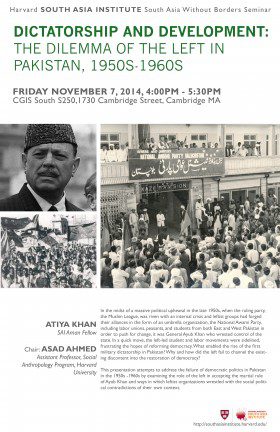South Asia Without Borders Seminar
Atiya Khan, SAI Aman Fellow
Chair: Asad Ahmed, Assistant Professor, Social Anthropology Program, Harvard University
In the midst of a massive political upheaval in the late 1950s, when the ruling party, the Muslim League, was riven with an internal crisis and leftist groups had forged their alliances in the form of an umbrella organization including labor unions, peasants, and students from both East and West Pakistan in order to push for change, it was General Ayub Khan who wrested control of the state. In a quick move, the left-led student and labor movements were sidelined, frustrating the hopes of reforming democracy. What enabled the rise of the first military dictatorship in Pakistan? Why and how did the left fail to channel the existing discontent into the restoration of democracy?
This presentation attempts to address the failure of democratic politics in Pakistan in the 1950s -1960s by examining the role of the left in accepting the martial rule of Ayub Khan and ways in which leftist organizations wrestled with the social political contradictions of their own context
Progressive politics in Pakistan: Q+A with Atiya Khan

